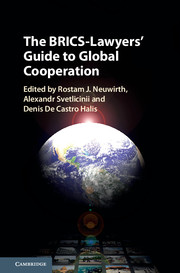13 results
Acknowledgments
-
- Book:
- The BRICS-Lawyers' Guide to Global Cooperation
- Published online:
- 29 September 2017
- Print publication:
- 12 October 2017, pp xiv-xxiv
-
- Chapter
- Export citation
Copyright page
-
- Book:
- The BRICS-Lawyers' Guide to Global Cooperation
- Published online:
- 29 September 2017
- Print publication:
- 12 October 2017, pp i-iv
-
- Chapter
- Export citation
Frontispiece
-
- Book:
- The BRICS-Lawyers' Guide to Global Cooperation
- Published online:
- 29 September 2017
- Print publication:
- 12 October 2017, pp xxv-xxviii
-
- Chapter
- Export citation
Introduction
-
-
- Book:
- The BRICS-Lawyers' Guide to Global Cooperation
- Published online:
- 29 September 2017
- Print publication:
- 12 October 2017, pp xxv-xxviii
-
- Chapter
- Export citation
4 - The BRICS Investment Framework
-
-
- Book:
- The BRICS-Lawyers' Guide to Global Cooperation
- Published online:
- 29 September 2017
- Print publication:
- 12 October 2017, pp 54-77
-
- Chapter
- Export citation
Conclusion
-
-
- Book:
- The BRICS-Lawyers' Guide to Global Cooperation
- Published online:
- 29 September 2017
- Print publication:
- 12 October 2017, pp 352-370
-
- Chapter
- Export citation
Index
-
- Book:
- The BRICS-Lawyers' Guide to Global Cooperation
- Published online:
- 29 September 2017
- Print publication:
- 12 October 2017, pp 371-378
-
- Chapter
- Export citation
Contributors
-
- Book:
- The BRICS-Lawyers' Guide to Global Cooperation
- Published online:
- 29 September 2017
- Print publication:
- 12 October 2017, pp xiii-xiii
-
- Chapter
- Export citation
Tables
-
- Book:
- The BRICS-Lawyers' Guide to Global Cooperation
- Published online:
- 29 September 2017
- Print publication:
- 12 October 2017, pp xii-xii
-
- Chapter
- Export citation
Contents
-
- Book:
- The BRICS-Lawyers' Guide to Global Cooperation
- Published online:
- 29 September 2017
- Print publication:
- 12 October 2017, pp v-vi
-
- Chapter
- Export citation
Dedication
-
- Book:
- The BRICS-Lawyers' Guide to Global Cooperation
- Published online:
- 29 September 2017
- Print publication:
- 12 October 2017, pp i-iv
-
- Chapter
- Export citation
Figures
-
- Book:
- The BRICS-Lawyers' Guide to Global Cooperation
- Published online:
- 29 September 2017
- Print publication:
- 12 October 2017, pp vii-xi
-
- Chapter
- Export citation

The BRICS-Lawyers' Guide to Global Cooperation
-
- Published online:
- 29 September 2017
- Print publication:
- 12 October 2017

